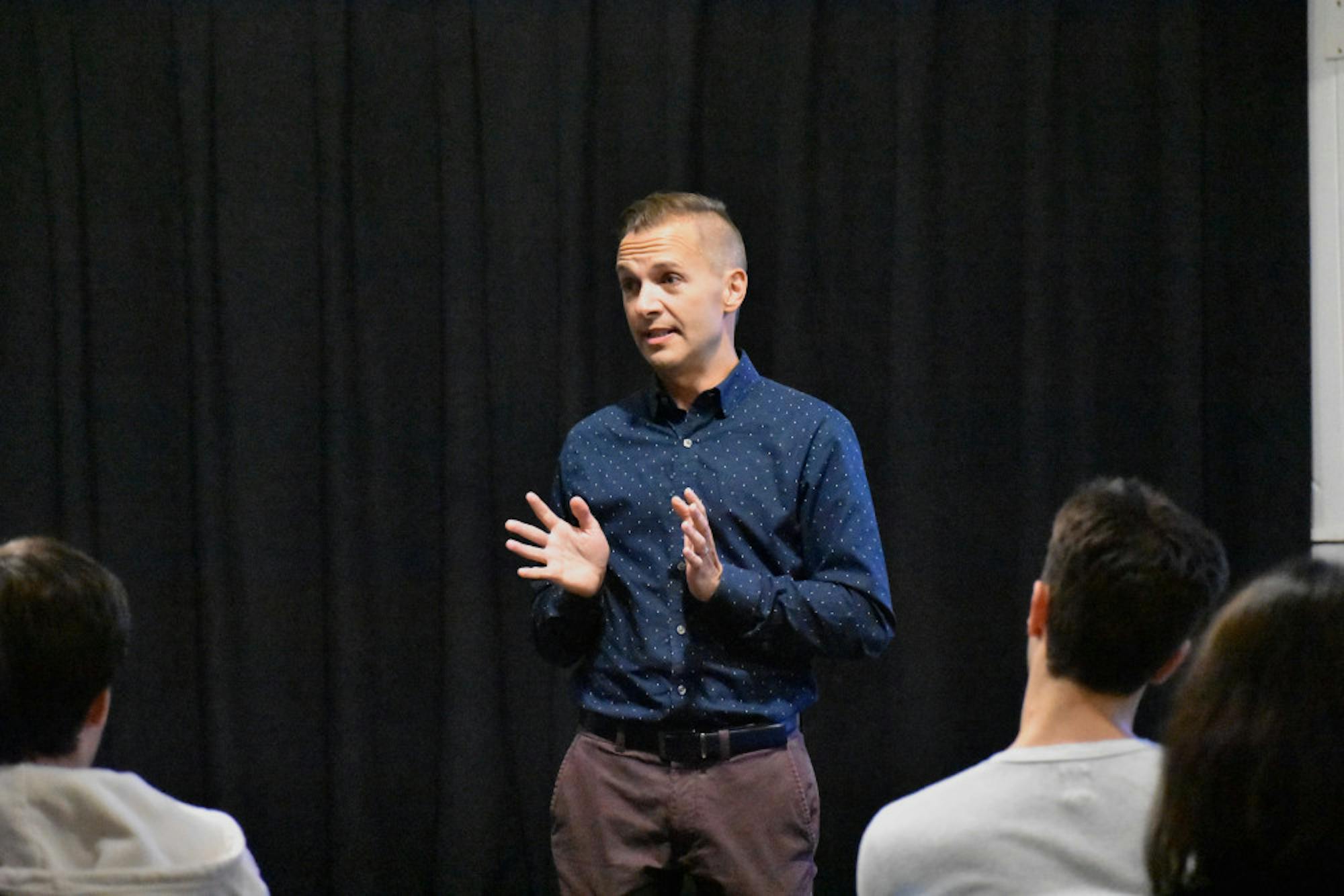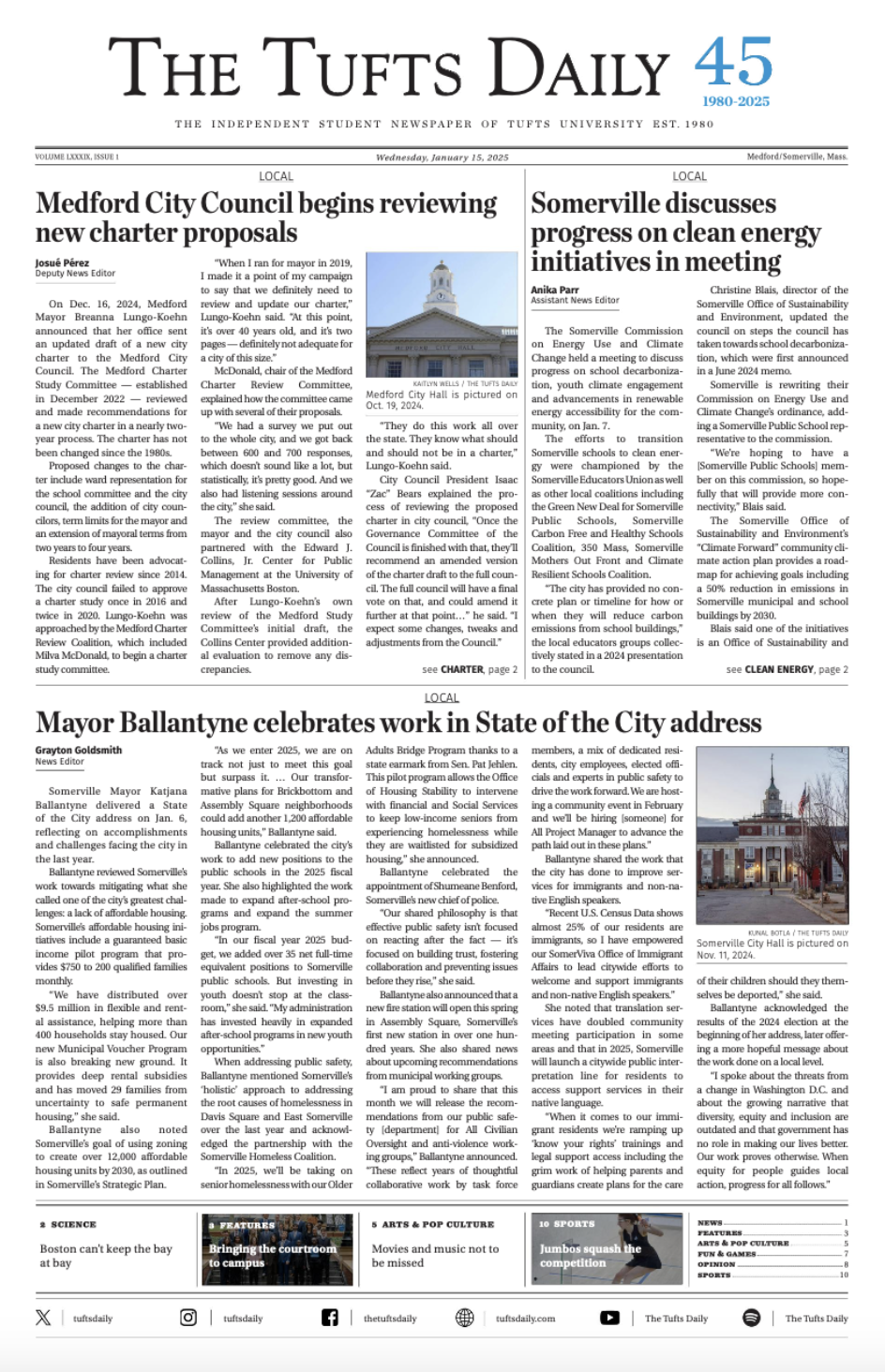With scheduled speaker Mauricio Artiñano's (LA '06) flight out of Newark delayed due to weather, it looked like Thursday's talk, “Living a Positive Life: A Conversation About Living With HIV," was going to be called off. But for Carl Sciortino (LA '00), former member of the Massachusetts House of Representatives for the 34th Middlesex District, which covers part of Tufts' Medford/Somerville campus, it mattered that the topic was discussed.
Sciortino is vice president of government relations at LGBT healthcare organization Fenway Health and a former executive director of the AIDS Action Committee of Massachusetts — the first person living with HIV to lead the group since its founding in 1982. Sciortino stepped up and shared his own experiences living with HIV with the roughly 30 people in attendance at the Curtis Hall Multipurpose Room.
Sciortino was elected to the Massachusetts House of Representatives in 2004. He won the Democratic primary against 16-year incumbent Vincent Ciampa by a margin of 93 votes. Sciortino talked about his time in the House, authoring legislation on transgender rights and using his position of power to help others.
Sciortino said that he was diagnosed with HIV in 2010.
“I was sobbing. I was just a wreck,” he said of his reaction to the news at the time.
Sciortino said that the diagnosis initially prompted him to consider quitting his job as a state legislator. However, he ultimately decided he was not going to quit, and instead devoted himself to shepherding a transgender rights bill that he co-sponsored through the legislature.
“I made a commitment to the community to push the bill forward," he said of the bill, which was introduced in January 2011.
He said that much of his bill was ultimately passed as a part of broader legislation on gender identity near the end of 2011.
Sciortino said that coming forward about his sexuality is not similar to coming forward about his HIV status.
“It’s not fun to say I have HIV. You don't get a pride parade,” Sciortino said.
Images that people have about the AIDS crisis have carried over into the collective mindset today, he said.
“Health-wise, I don't think people really know what it's like to have AIDS in 2018," he said. "We have so many historic images of what the AIDS crisis was in people's minds. It’s so ingrained in our culture. If you look at any gay dating app, the word 'clean' is thrown out. The word 'clean' is so prevalent in that cultural context, that once you get an HIV diagnosis, you are saying ‘Oh I’m not clean. That must mean I’m dirty.’”
He explained the concept of “undetectable equals untransmittable.” This means that if someone has HIV and they are taking medication, and the virus is not detectable, then it is also not transmittable.
In 2013, Sciortino was asked to lead the AIDS Action Committee of Massachusetts. He left the State House to accept the position, announcing then for the first time that he had HIV.
Sciortino said that he was fortunate to have a partner who stayed with him, health insurance and a bed to sleep in at night. He said that the people whom he helps through the AIDS Action Committee are not always in such a situation. Most of the people who come in are homeless and, more often than not, make less than $10,000 a year, he said.
The second portion of the talk focused on HIV-related healthcare resources at Tufts. Margaret Higham, medical director of Tufts Health Service, spoke about Pre-Exposure Prophylaxis (PrEP), a once-a-day pill that prevents exposure to HIV.
Tufts students are eligible to receive PrEP at no cost through insurance, Higham said. She noted that the number of students seeking such treatment has increased.
"[It's up] from 30 students last year to 55 this year," she said.
Artiñano arrived after the event concluded, according to first-year master's student at The Fletcher School of Law and Diplomacy Jacob Hafey (LA '18), who helped publicize the event. Hafey said that Artiñano spoke to a smaller group of students about his own experiences living with HIV, as well as his work in multilateral diplomacy with the United Nations.
Hafey said he had been at a previous campus talk with Artiñano. Thursday's talk was scheduled because relatively few students attended the first iteration, Hafey said, but he gave praise to the speaker who ultimately stepped in on Artiñano's behalf.
"[Sciortino] had a lot of similarities to [Artiñano]; he was able to speak on the issues very well," Hafey said. "I think a lot of people learned a lot about HIV awareness and about the stigma that comes along with it in society today. ... I was very happy with how the event turned out, even without Mauricio there for most of it."
Former Mass. State Rep. Carl Sciortino speaks on living with HIV

Carl Sciortino (LA '00), vice president of government relations at Fenway Health and former executive director of the AIDS Action Committee of Massachusetts, shares his story about living with HIV in the Curtis Hall Multipurpose Room on Oct. 11.





